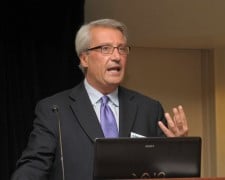 In an interview with Bloomberg Television’s Betty Liu from the Supreme Court, Aereo CEO Chet Kanojia said, if they lose it is “inevitable” that someone else will come along in the next five years and win, “Nobody will sit here and say it is not inevitable. It is inevitable that it will transfer online. It is inevitable that there will be more choice. It is inevitable.” See the full interview here:
In an interview with Bloomberg Television’s Betty Liu from the Supreme Court, Aereo CEO Chet Kanojia said, if they lose it is “inevitable” that someone else will come along in the next five years and win, “Nobody will sit here and say it is not inevitable. It is inevitable that it will transfer online. It is inevitable that there will be more choice. It is inevitable.” See the full interview here:
On whether this is a copyright issue or about broadcasters getting rich:
“This whole thing has been about making sure the consumer gets the signal. It’s not about making a couple of guys rich in the middle of it. So in we come, a completely different technology, and a technology based in the roots of broadcasting and antenna. None of them can dispute the facts because unfortunately in this case, they don’t have a way to dispute the facts because of the technology work that we did. So there’s all this concoction and basically false air that’s been created that somehow this is a copyright problem. It’s not. The problem is it’s a business model problem. The world is changing around these guys and they are reacting with what they know, which is litigate and kill new companies that come in, because they’re making far too much money and continuing to make far too much money and they have no incentive to change.”
So here’s one of the issues, right, if we don’t apply this technology to a cable channel like HBO or whatever, there is a reason they’re called free to air broadcast television. There is the essential bargain with the consumer and Congress is the program in the public interest, free to the consumer. They make money, billions and billions, with advertising, 90 plus percent. That bargain is preserved. Sixteen million people in America today, according to the National Association of Broadcasters, uses an antenna. Are those people infringing on their copyrights? No, they’re not. Tons of companies make money selling equipment & technology — TiVo, every antenna manufacturer out there. All these companies make money by selling technology to consumers…”
“I think TiVo is a great example. I point this out. You can get a retail TiVo box. You can plug an antenna into it and, in fact, TiVo will sell you video and on demand videos from the Internet side by side. Where is this copyright infringement? It is only copyright infringement because I have located the box and made it simpler for the consumer to get it?”
On meeting with broadcasters before starting Aereo:
“We announced our existence and we did these tours, for about seven months. And when we announced our intention of launching a particular day, that’s when they responded with a lawsuit.”
On whether there were any reactions from broadcasters during the 7-months he toured:
“No reaction. No reaction.”
On whether he respects broadcasters:
“I’m sympathetic to the market conditions that they are involved in. The Internet is happening all around us, all of us, you know, and the Internet has sort of this weird characteristic of transparency, given more choice. Consumers get more agile and nimble. Young people even more and more, they have attention span problems but not a bad thing because they have so much choice, right? So I’m sympathetic to the fact that there’s a lot going on in the marketplace. And you have, you know, Netflix is doing interesting things, and they’re adding pressure in the market. All of these things are happening. So I’m sympathetic to world changing. What I’m not sympathetic to is the idea to litigate and try to kill versus take a step back, work with people and exploit technology to make efficiencies in the marketplace.”
“I don’t think anybody can feel sorry for executives making $100 million a year. You know, what I’m sympathetic to is I’m sympathetic in the most general sense. I’m aware that the market is changing and evolving. And I think all of us are.”
On whether it is inevitable that broadcasters will get caught flat-footed by Aereo or somebody else:
“Nobody will sit here and say it is not inevitable. It is inevitable that it will transfer online. It is inevitable that there will be more choice. It is inevitable. There is nothing online that sells for $300 a month except for maybe a very small little niche wine club or something.”
On what happens if Aereo loses:
“Technology is changing, we created this incredible infrastructure technology even if you take the antenna components out that does wires, the applications integrations now, we’re doing with social experiences. I think that’s tremendously valuable. I have no idea what happens to them, but I do feel that what we have created has tremendous value. To be seen how we can use it.”
I hope we don’t [lose] and I feel confident that we won’t. But even if we do, you know, I think [another company just like Aereo will come along and be able to break through]. It is inevitable. It’s going to happen.”
On relationship with Barry Diller:
“I think he’s a great adviser. He’s a primary and significant investor in the company and I’d say the relationship, from my perspective, is he’s available to the company any time we need advice, we get his help to think thru major decisions. He’s one of those people that I like in the sense that he says you know what, this is your business, you run it, make stuff happen and when you need me call me. So it depends in the frequency, you know, of what’s going on. It could be once a week, twice a week, four times a day, once every month. It purely is a function of the –what’s going on.
“He is [going to be here]. We all feel very strong. Remember, as a winning party, most people don’t want to go to the Supreme Court. We made this election consciously as a company something frankly because he’s so aligned with what Congress always wanted, which is to promote broadcasting and making that bringing more and more people into it, especially in these times, where there is a huge difference between the price of an antenna or an antenna based technology like Aereo and the price for cable.”
On his strongest argument:
“It’s one antenna, one consumer, one stream, one file, all things that are perfectly legitimate and millions of people do it today. So how could it be wrong to do it from a remote location? People make money selling equipment. People lease equipment all day long. Nothing about any of these things is novel or illegal.”
On whether Aereo is a threat to cable operators:
“We’re not. And I think we are a big benefit to broadcasters because we bring more audience in. Twenty-five year olds are not signing up for cable TV in New York City and watching the “Today” show with Time Warner Cable. They understand Aereo to do that.”
On the differences between Aereo and Cable companies:
“So there’s a huge difference between a cable company and Aereo, right, if you look at just the art of the technology itself. The cable companies take the entire broadcast spectrum and push it down to consumers whether or not a consumer asks for it. So they make their whole transmission, whereas we saw a big contrast. The signal never enters the Aereo systems. Every consumer for themselves tunes their own antenna, a big technological
difference.”
“Cable companies are regional monopolies. The idea of retransmission, it’s not in copyright law. This is a false narrative that the broadcasters have painted out there. Retransmission is not copy write payments but in fact, cable companies or satellite companies make no copyright payment in the market that they transmit in.”;
On what Aereo hasn’t been able to focus on because they have been consumed with the Supreme Court case:
“Oh, a lot. I mean I think we’ve been very slow in our work, uh, because we’ve been cautious. This is an infrastructure company. It requires a lot of capital. So it’s been a measured amount of capital deployment, to make sure that you are being judicious.”
On his disappointment in the DOJ decision:
“It is shocking and disappointing. Um, but it’s a very narrow copyright office’s perspective. It’s not all the other departments in the government that we hoped and wished, uh, would have commented. But it’s the copyright office. I don’t think there’s a single instance in which they come out in support of a technology. They always come out in against the technology and in support of copy right laws.”
On previous VCR case at the Supreme Court:
“This is — this is well settled law. There is no question about this. A VCR manufacturer did the exact same thing. So the only debate here is I have somehow made it simpler, so now consumers are going to exercise their right and they know that the threat really is the consumers exercising their right to take an antenna, because they are raising their rates so dramatically on the cable side.”

Bruce Beckner, Owner at Garvey Schubert Barer, commented on Kanojia’s thinking here: “Kanoija’s argument is essentially the one that persuaded the Supreme Court in the Fortnightly case that “community antenna” systems did not infringe on the copyrights owned by the producers of the programs shown on the television stations’ broadcasts. What happened eight years later is instructive.
In the 1976 Copyright Act (revising the prior 1909 Act), the Congress changed the rules and made community antenna (aka “cable”) systems pay for a license to retransmit these programs or be subject to liability for copyright infringement. The 1976 Act explicitly dovetails with the FCC’s cable broadcast signal carriage regulation, whose stated goal was to protect local broadcasters from loss of audience to distant broadcast signals brought in by the community antenna. This change did not provide much of a revenue stream to local broadcasters, but, especially after distant signal copyright rates were raised in the early 1980s, it provided a big disincentive to import “superstations,” (i.e. distant signals from other markets). Between the FCC and the Congress, the local broadcaster’s audience was protected. (Of course, all of this collapsed when cable networks got started, which were distributed to local cable affiliates by satellite. Then, people had choices no one had ever dreamed of: feature films shown on TV without commercial interruptions!)
To a non-lawyer, a lot of these distinctions probably seem arbitrary — and they are. But copyright ownership always involves striking a balance between the public’s desire to have access to creative works at minimal or no cost and the works’ authors’ need to get paid in order to keep producing the works — films, images, music, books, etc. – that everyone enjoys. The Congress is where this balance gets struck and, as a result, some of the distinctions reflecting the comprises which strike that balance seem a little arbitrary. After all, “a camel is a horse designed by a committee.”
The practical reality is that someone is, for example, paying the NFL a lot of money for rights to broadcast the Super Bowl. The folks who are bringing that game to public viewership at no charge – the network and its affiliates – have to generate the money to pay for the rights they bought. Today, with the general loss of audience to cable nets, broadcast nets don’t pay affiliates to carry network programming any more. More often, the money flows in the other direction. And those affiliates, thanks to the 1992 Cable Act, now have the ability to receive payment from the cable systems which carry their programming. Aereo is disrupting that system; that’s why its attractive. It has found, it thinks, a loophole. But, if the Supreme Court permits Aereo to continue its present business model, the system will adopt to Aereo’s presence in ways that can’t be predicted. So, while in the short term, the public might be said to benefit from the ability, through Aereo, to get attractive local broadcast programming through means other than their own antenna without having to pay retransmission consent fees or copyright royalty (which is embedded in their cable or DBS operator’s bill); there’s no assurance that the situation will continue. The broadcast TV industry is not as rich as it was 20 or more years ago, and retransmission consent revenue is a not insignificant part of the broadcast industry’s income. So, if that’s jeopardized by Aereo, the end result could be the migration of expensive programming (like major sports) to exclusively pay platforms.
Or Congress could simply change the rules, as it did in 1976 with the cable industry, and define Aereo’s retransmission activity as infringement, perhaps without even giving it access to the kind of compulsory license that the cable industry received. That would be a shocker.”

Said Francisco Montero, Managing Partner, Fletcher, Heald & Hildreth, P.L.C.: “The tone of this interview feels like the post-mortem of someone who may be coming to terms with possible defeat at the Supreme Court. And since an adverse decision by the highest court could mean the end of Aereo as business venture, there seems to be a focus on the technological legacy of the Aereo venture rather than the business success. I’m inclined to agree with him that the technology will survive, but this case was not about technology, it was about the use of copyrighted material in a public performance. That is the issue. The Supreme Court’s questioning suggested that they were not as clear on how Aereo is that much different from a cable system which must pay to retransmit TV signals. However, one significant offshoot of a Supreme Court decision favoring the broadcasters will be how it will impact cloud computing and whether use of the cloud to store information could inadvertently fall into the definition of a public performance. In the recording industry, record labels did not see the immense impact of the internet and file sharing and they did not adequately protect their intellectual property. Broadcasters were determined to not make that same mistake.”
PS. We heard the justices hammered Aereo a bit on 4/22.





